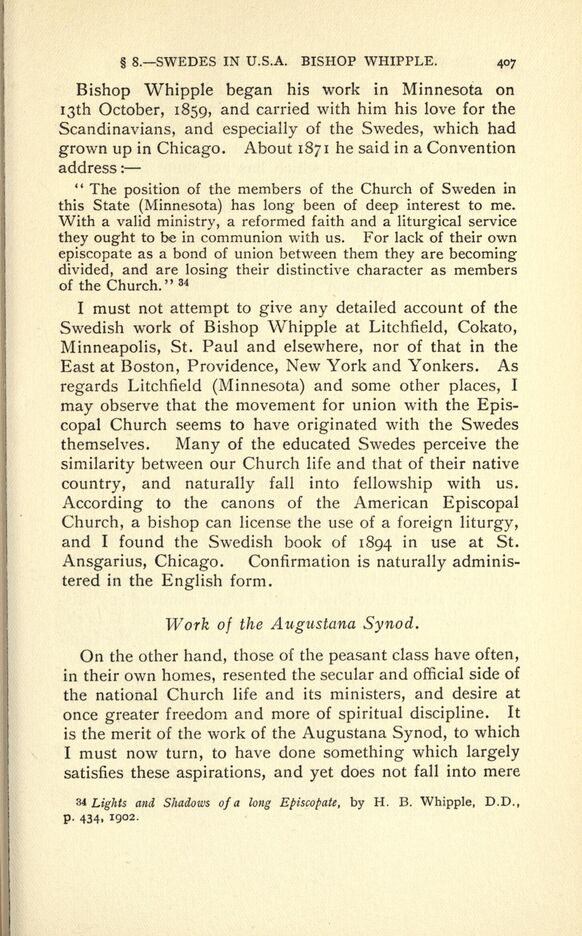
Full resolution (JPEG) - On this page / på denna sida - VIII. The Church in the last century (1811—1910 A.D.)

<< prev. page << föreg. sida << >> nästa sida >> next page >>
Below is the raw OCR text
from the above scanned image.
Do you see an error? Proofread the page now!
Här nedan syns maskintolkade texten från faksimilbilden ovan.
Ser du något fel? Korrekturläs sidan nu!
This page has never been proofread. / Denna sida har aldrig korrekturlästs.
8. SWEDES IN U.S.A. BISHOP WHIFFLE. 407
Bishop Whipple began his work in Minnesota on
I3th October, 1859, and carried with him his love for the
Scandinavians, and especially of the Swedes, which had
grown up in Chicago. About 1871 he said in a Convention
address :
11
The position of the members of the Church of Sweden in
this State (Minnesota) has long been of deep interest to me.
With a valid ministry, a reformed faith and a liturgical service
they ought to be in communion with us. For lack of their own
episcopate as a bond of union between them they are becoming
divided, and are losing their distinctive character as members
of the Church.
"
34
I must not attempt to give any detailed account of the
Swedish work of Bishop Whipple at Litchfield, Cokato,
Minneapolis, St. Paul and elsewhere, nor of that in the
East at Boston, Providence, New York and Yonkers. As
regards Litchfield (Minnesota) and some other places, I
may observe that the movement for union with the Epis
copal Church seems to have originated with the Swedes
themselves. Many of the educated Swedes perceive the
similarity between our Church life and that of their native
country, and naturally fall into fellowship with us.
According to the canons of the American Episcopal
Church, a bishop can license the use of a foreign liturgy,
and I found the Swedish book of 1894 in use at St.
Ansgarius, Chicago. Confirmation is naturally adminis
tered in the English form.
Work of the Augustana Synod.
On the other hand, those of the peasant class have often,
in their own homes, resented the secular and official side of
the national Church life and its ministers, and desire at
once greater freedom and more of spiritual discipline. It
is the merit of the work of the Augustana Synod, to which
I must now turn, to have done something which largely
satisfies these aspirations, and yet does not fall into mere
34
Lights and Shadows of a long Episcopate, by H. B. Whipple, D.D.,
p. 434, 1902.
<< prev. page << föreg. sida << >> nästa sida >> next page >>